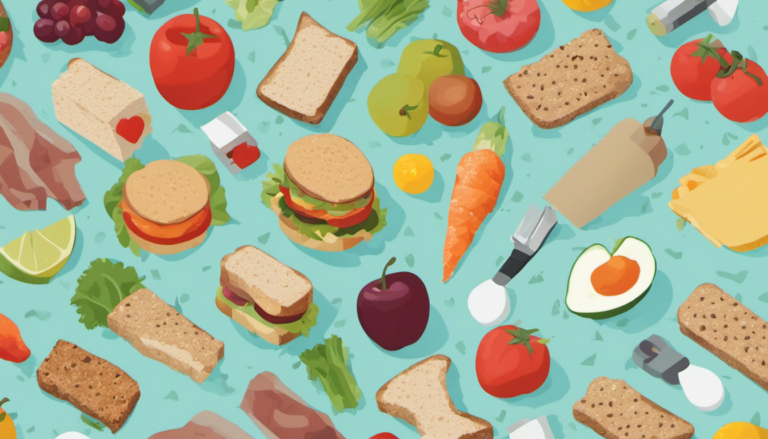Are Detox Diets a Myth
I. Introduction
Detox diets, often touted as a quick fix for weight loss and improved health, involve a short-term dietary intervention designed to eliminate toxins from the body. These diets typically involve a period of fasting, followed by a strict diet of fruits, vegetables, fruit juices, and water. Some detox diets also include herbs, teas, supplements, and colon cleanses or enemas.
While detox diets are popular, it’s important to understand the science behind them, their potential risks, and the role of regular diet and exercise in maintaining health. This article will delve into these topics, providing a comprehensive look at detox diets.
For a more in-depth look at various dietary plans and recipes, including detox diets, visit our dietary plans and recipes page.
II. The Concept of Detoxification
The human body has its own natural detoxification process. The liver, kidneys, digestive system, skin, and lungs all work together to remove toxins from the body. The liver and kidneys play a particularly important role in this process. The liver detoxifies harmful substances, while the kidneys filter out waste products from the blood.
Detox diets are based on the concept that the body needs help in eliminating toxins. However, it’s important to note that a healthy body is perfectly capable of detoxifying itself. The best way to support your body’s natural detoxification process is to consume a balanced diet, stay hydrated, get regular exercise, and avoid harmful substances such as tobacco and excessive alcohol.
For more information on how the body naturally detoxifies itself, check out our natural remedies and supplements page.
III. The Popularity of Detox Diets
Detox diets have gained popularity in recent years, largely due to celebrity endorsements and the influence of social media. Celebrities often share their experiences with detox diets, claiming improved health, weight loss, clearer skin, and increased energy. These endorsements can have a significant impact on public perception and acceptance of detox diets.
Social media platforms also play a crucial role in promoting detox diets. Influencers often share detox diet products and their experiences with these diets, reaching a wide audience. However, it’s important to remember that these endorsements often lack scientific backing and may not represent a balanced approach to health and wellness.
For a closer look at the influence of social media on health and wellness trends, visit our lifestyle and environment page.
IV. The Science Behind Detox Diets
Detox diets make a variety of claims, from promoting weight loss to improving skin health and boosting energy levels. However, the scientific evidence supporting these claims is often lacking. Most research on detox diets is observational and based on small sample sizes, making it difficult to draw definitive conclusions.
While some people may experience short-term weight loss on a detox diet, this is typically due to a reduction in calorie intake and water weight, rather than fat loss. Additionally, there is little evidence to support the claim that detox diets improve skin health or boost energy levels.
For a more detailed analysis of the science behind detox diets, check out our detox diet facts page.
V. The Potential Risks of Detox Diets
While detox diets may seem appealing, they can pose several risks. These diets often involve severe calorie restriction, which can lead to nutritional deficiencies. Common deficiencies include protein, essential fatty acids, and various vitamins and minerals.
Detox diets can also lead to dehydration and electrolyte imbalances, particularly if they involve laxatives or diuretics. Long-term use of these diets can lead to serious health problems, including heart and kidney damage, weakened immune system, and poor bone health.
For more information on the potential risks of detox diets, visit our detox diet facts page.
VI. Case Studies on Detox Diets
There are many anecdotal reports of success with detox diets. Some people report feeling lighter, more energetic, and healthier after following a detox diet. However, it’s important to remember that these are individual experiences and may not be representative of the average person’s experience.
On the other hand, there are also many negative experiences associated with detox diets. Some people report feeling weak, dizzy, and nauseous while on a detox diet. Others have experienced more serious health problems, such as kidney damage, as a result of these diets.
For a closer look at real-life experiences with detox diets, check out our detox diet facts page.
VII. The Placebo Effect and Detox Diets
The placebo effect is a psychological phenomenon where a person experiences a perceived improvement in their condition due to their belief in the treatment, rather than the treatment itself. This effect can play a significant role in the perceived benefits of detox diets.
Many people believe that detox diets will improve their health and help them lose weight, which can lead to a placebo effect. They may feel better or believe they have lost weight simply because they expect to, not because the diet is actually effective.
For more information on the placebo effect and its role in health and wellness, visit our mental wellness and stress management page.
VIII. The Role of Regular Diet and Exercise
While detox diets may seem like a quick fix, the best way to maintain health and manage weight is through regular diet and exercise. A balanced diet, rich in fruits, vegetables, whole grains, lean proteins, and healthy fats, can provide all the nutrients your body needs to function properly.
Regular exercise, whether it’s walking, running, cycling, or strength training, can help maintain a healthy weight, improve heart health, and boost mood and energy levels. It’s also important to stay hydrated and get enough sleep.
For more information on the benefits of regular diet and exercise, visit our exercise and fitness and dietary plans and recipes pages.
IX. The Role of the Food Industry
The food industry plays a significant role in the popularity of detox diets. Many companies market detox diet products, such as juices, teas, and supplements, promising quick weight loss and improved health. These marketing strategies often target people’s desire for a quick fix, rather than promoting a balanced approach to health and wellness.
The detox diet industry has a significant financial impact, with sales of detox products reaching billions of dollars each year. However, it’s important to remember that these products are not regulated by the Food and Drug Administration (FDA), and their claims are often not backed by scientific evidence.
For a closer look at the role of the food industry in health and wellness trends, visit our lifestyle and environment page.
X. Conclusion
In conclusion, while detox diets may seem appealing, they are not a magic bullet for health and weight loss. The human body is perfectly capable of detoxifying itself, and the best way to support this process is through a balanced diet, regular exercise, and a healthy lifestyle.
Detox diets can pose several risks, including nutritional deficiencies, dehydration, and long-term health problems. It’s important to approach these diets with caution and to consult with a healthcare professional before starting a detox diet.
For more information on healthy living, including diet, exercise, and wellness tips, visit our lifestyle and environment, exercise and fitness, and dietary plans and recipes pages.







